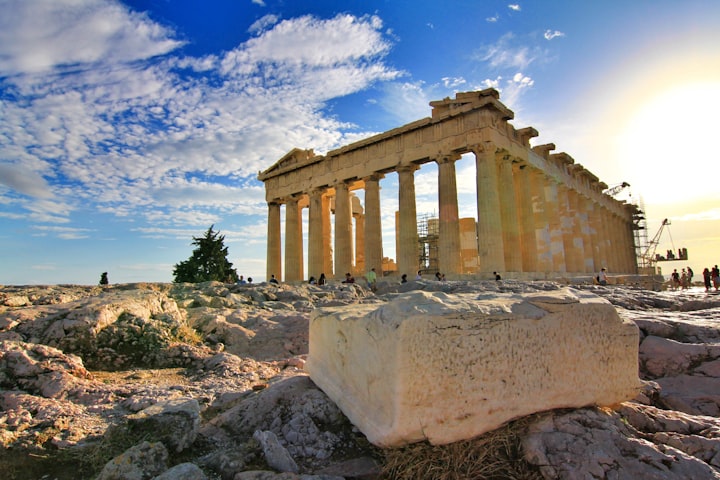Childless Aegeus was the king of Athens. His greatest wish was for a son to succeed him. He journeyed to the Oracle of Delphi to seek advice. The Oracle told him: “Do not drink freely of wine until you are safely home in Athens, lest you die of grief.”
Aegeus was staying as a guest at the court of King Pittheus. The king understood the prophecy and persuaded Aeugeus to drink until he could barely stand. Pittheus then brought his daughter, Aethra, to Aegeus’ bed. He wished to be allied to Athens, and to the throne.
As Aegeus was leaving for Athens, Pittheus asked him to leave his sandals and a sword. “If there is a male child,” said Pittheus, “You will know him by these tokens.” Aethra became pregnant and was delivered of a son. She named him Theseus.
Theseus grew to manhood in his grandfather’s house. When he was old enough, Aethra gave him the sword and sandals, and told him of his father. “You must travel to Athens, “she said, “You are Aegeus' heir.”
Theseus travelled overland with his war companions to his father’s court, along the great coastal road from Troezen to Athens, killing many bandits who preyed on travelers. His reputation preceded him. When Aegeus heard that the hero Theseus had come to his city, he prepared a great banquet for him.
As Theseus entered the great hall, he took off his sword and gave it to Aegeus as a gesture of good intention. Aegeus felt the weight of his old sword in his hand, slipped his fingers around the pommel. He looked closely at Theseus’ sandals and recognised them as well. Aegus embraced Theseus, holding him close, and weeping. He finally had the son he had desired for so long.
The king held games and celebrations for a month to celebrate the return of his son and heir. Theseus settled into life at the court of Athens. Aegeus, by now in middle age, grew to love the son he had only known as a man. Theseus had grown up without a father and came to share Aegeus’s feelings. To anyone who saw them laughing and jesting together, they seemed as bonded as a father and son who had always known each other.
Theseus and Aegeus spent a great deal of time together, making up for all the lost years. They rode out to farms in the countryside to check the harvest. They went hunting for boar in the hills around the city. Aegeus made many generous offerings at the temples to thank the gods for his son’s return.

There came the time of tribute. Many years before, King Minos of Crete had lost his eldest son in a war against Athens. Minos had won the war. He agreed to spare the city on one condition: a tribute of seven handsome youths and seven beautiful maidens was to be sent annually to Crete as reparation for the loss of his son. The youths would be sacrificed to the Minotaur, a monstrous half-man, half-bull, that lived in a labyrinth under the royal palace. Since birth, the Minotaur had only an appetite for human flesh. The grotesque, misshapen creature was born to Minos and his queen. The king could not bear to kill his own son, however hideous. He hired the architect Daedelus to devise an intricate labyrinth under his palace, in which the creature was imprisoned.
Theseus knew that refusing to send tribute would cause a new war. He decided to slay the Minotaur. Aegeus refused to hear of it at first. Theseus persisted. “Father,” he said, “How can we ask the people of Athens to make a sacrifice that our family is not willing to make?” Eventually, when he saw that Theseus was determined to go, Aegeus relented. He asked Theseus to carry both white and black sails on his ship. “If you’re victorious, use white sails,” he said. “Then I will know you are returning to me. But if you fail, tell the ship’s captain he must use the black sails.”

From the harbor at Knossos, Theseus saw the great palace of Minos above the city. He knew that beneath it, cut into the living hill, lay the Minotaur's labyrinth.
He saw a woman on the docks, heavily veiled, standing at the front of the crowd. As he looked at her, she drew her veil away. Theseus inhaled sharply. She was the most beautiful woman he’d ever seen and, in that moment, he fell in love. Just then, one of his war companions came to his elbow and spoke to him. Theseus turned to the man, distracted, and then looked back quickly at the dock. The woman was gone.
Theseus and the Athenian youths were met at the palace by soldiers. They took their weapons from them. Servants brought the youths to spacious chambers, gave them food and new clothes and poured perfumed baths.
Theseus was restless that night and couldn’t sleep, thinking of how he might kill the Minotaur. A figure slipped into his room. He rose to defend himself, only to find himself staring at the woman from the docks. She told him her name was Ariadne and she was the daughter of the king. She had also fallen in love with him and wished him to succeed in killing her brother, the Minotaur. “You will free us all from this curse that has blighted our land for many years and that traps my father in shame,” she said.
Ariadne gave Theseus a ball of string and a dagger. She warned him to hide both in his tunic so that the guards at the maze would not find them. “When you enter, tie one end of the string and use it to find your way back.” said Ariadne, “Go straight ahead, always descend and never turn left or right. That way you will come to the heart of the maze where my brother is to be found.”
In the morning, Theseus and the Athenian youth were taken to the entrance of the labyrinth. The soldiers beat drums to alert the Minotaur and drove the youths and maidens into the maze with their spears. The girls wept and the boys trembled as they heard mighty bellows echoing around them.
Theseus told the youths to wait for him by the entrance, followed Ariadne’s instructions and eventually came to the heart of the maze. There stood the Minotaur, with the great head of a bull and the body of a man. When he saw Theseus, the creature roared and charged. The two foes fought long and hard. Both of them were injured and bleeding.
Suddenly, Theseus tripped and fell on the sand, now stained in many places with blood. The Minotaur advanced. Theseus grabbed one of the monster’s heels and twisted it, causing the creature to fall heavily on its back.
Theseus quickly rolled over and plunged his dagger into the beast’s throat. The Minotaur’s lifeblood spurted out in great gouts. His human hands grabbed Theseus’ to take the knife but the creature was fast losing strength and his fingers slipped in his own blood. Theseus held fast. Then the Minotaur spoke, the words liquid and burbling, ”I may be a monster whose own father could not bear to look upon him, but even such a creature as I does not deserve this fate.” He cried out to Poseidon, the protector of Crete. “Hear me, Great Sea God,” said the Minotaur, his voice ragged: “May the man who kills me cause the same despair to his father that I have caused to mine.” Then the mighty beast shuddered and died.
Theseus followed the thread back to the entrance, where the youths waited anxiously. When they saw their prince still alive, they cried from relief.
As the Athenians emerged, Theseus saw Ariadne waiting. She held an empty wine flask in her hands. The guards were slumped over at their posts, asleep. “Quickly,” she whispered to Theseus, “I have drugged the guards. Return to your ship and wait for me there. I need to say goodbye to my mother.”
Theseus agreed to wait. However, as soon as he lay down on the deck of his ship, worn out from the fight, he fell asleep. The captain, fearing that Ariadne would betray them, instructed his sailors to set sail.
When Theseus awoke, many hours later, the ship was far at sea. He was in a rage. He had lost Ariadne. The captain cowered as he told Theseus that he feared betrayal. But it is a mortal error to offend a prince. Theseus grabbed a sword from one of his war companions and killed the captain. In his rage and grief, Theseus forgot the sails.

The Captain of the Royal Guard entered the throne room and knelt before the king.
“My lord,” he said, “The outlooks have seen the prince’s ship on the horizon.”
Aegeus felt a shadow cross his heart. “Tell me quickly, Captain, are the sails white or black? Does my son live or no?” he asked.
The Captain hesitated. Then he spoke slowly, “My lord, the sails are black.”
Aegeus began to cry out again and again, a terrible sound of anguish and despair that echoed through the palace complex. Cooks heard it in the kitchen and stopped. Servants froze in the middle of folding clothes or sweeping. Aegeus’s horse in the royal stables heard his master’s voice and whinnied. The king’s dogs in the courtyard began to bark. The cries went on and on.
Courtiers looked at each other, tears coursing down their cheeks. Their prince was dead.
Aegeus staggered from the room, racked with great sobs that almost choked him. Slowly, he climbed to the highest wall of his palace, overlooking the sea, and like a wingless Icarus, stepped off into air.

As Theseus’ ship drew against the dock, the crew and passengers heard a dreadful keening coming from the palace at the top of the city, many women giving voice as one to a tremendous grief.
Theseus stared up at the palace. A chill settled over his heart. Only a royal death triggered such an outpouring of grief. Then he remembered the sails.
“My lord, you should hurry to your father. Show him that you live,” said one of his war companions. A groom held the reins of a group of horses on the dock. Theseus grabbed those of the nearest horse, swung himself up and urged the horse to a gallop.
Horse and man flew through the narrow streets, climbing higher and higher through the city, hoofbeats echoing off the walls of houses. Knots of people parted hastily. Hens squawked and dogs barked. Theseus slid off the horse at the main palace gate, handed the reins to a guard and oblivious to the soldiers saluting him, hurried towards the throne room.
There was a crowd gathered. Theseus pushed his way through until he came to the middle, and saw a bundle on the floor, a pile of sodden clothing. Rivulets of water ran across the floor. He saw Aegeus’ face, pale in death, his muscular arms flaccid by his side. “What is this evil?” asked Theseus. He looked around at the crowd. His father’s consorts, faces streaked with tears, were tearing their clothes. The wailing continued.
“My lord,” said one of the councillors, “We saw the black sails. Your father thought you dead. His grief was so great that he threw himself into the sea.”
Theseus heard again the Minotaur’s dying words: “May you cause your own father the same despair that I have caused mine.”
Theseus, slayer of the Minotaur, beloved of Ariadne, King of Athens and ruler of Attica, knelt and, cradling his father’s broken body against his chest, wept like a child.
About the Creator
Liz Sinclair
Amateur historian who loves travel and lives in Asia. I write 'what-if' historical stories, speculative fiction, travel essays and haiku.
Twitter: @LizinBali. LinkedIn: sinclairliz







Comments
There are no comments for this story
Be the first to respond and start the conversation.